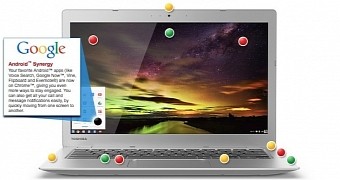Google has been talking about Android apps on Chrome OS at its I/O this summer and in September it subsequently announced official support for some Android apps.
Basically, the search giant is taking the first few steps towards the convergence of the two operating systems. Google envisions a future where you can be on your Chromebook or Chromebox and be able to take advantage of the full host of apps traditionally available on tablets and smartphones.
Say hi to the first Android apps running on Chrome OS
For the time being only a few apps are officially supported by Google, but in the upcoming store the App Store could be teaming with Android-apps compatible with Chrome OS.
But while we wait on that, Chrome OS users can take advantage of Duolingo (language learning), Evernote, Vine and Sight Words (learning to read). All these apps are developed using the Android Runtime for Chrome (ARC) tool and are Chrome OS ready and waiting to be downloaded.
Now, the folks over at Chrome Story have discovered something interesting while browsing through the product page of the Toshiba Chromebook 2.
They uncovered a few references to Android apps not available on Chrome OS. The information pops up while one checks out an interactive overview of the Toshiba Chromebook 2 with Bay Trail processor.
The term “Android Synergy” shows up online
Apparently, Chromebooks will take advantage of something called “Android Synergy,” which includes Android applications such as Voice, Search, Google Now, Vine, Flipboard and Evernote.
Flipboard was one of the first apps to be demoed on a Chromebook, so the fact that the first batch of Android apps didn’t include it does seem a little strange.
How about Google Now and Voice Search? Well, it appears somebody at Toshiba has made an error in judgment when writing that phrase. What they were probably trying to say is that Chrome OS includes features of Android.
But since Android L is expected to make an appearance in November, nothing is certain anymore. We’ll have to wait a few weeks to see what exactly is the case.
The Toshiba website also goes on to mention the ability “to get all your call and message notifications easily, by quickly moving from one screen to another.” This is another feature that was demoed this summer, but we are yet to actually see it in the wild.
The Toshiba Chromebook 2 arrived not so long ago with the same 13.3-inch 1080p display and drawing power from an Intel Celeron N2840 dual-core processor clocked at 2.1GHz.

 14 DAY TRIAL //
14 DAY TRIAL //